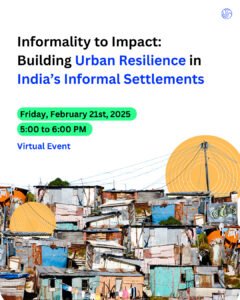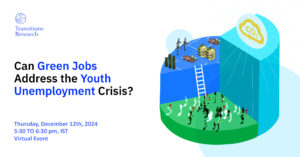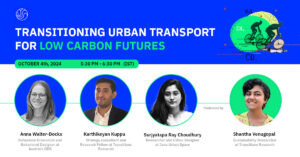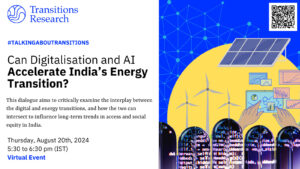Talking About Transitions feature critical conversations on systemic transitions at the interplay of technology, society and sustainability. Our Dialogue series provides a platform for thinking together about three major areas of change and challenge – urbanisation, climate change and digitalisation.
Our dialogue, Can We Thrive in a Warmer World? was held on Monday, June 3rd from 5:30 to 6:30 pm IST
Overview: With 2023 surpassing 2022 as the hottest year on record, extreme heat is emerging as a critical climate challenge. It is increasingly certain that our future will be warmer than it is today. Even as countries pledge to reduce emissions, there is a certain degree of heat that we are locked-in to, given the current concentration of greenhouse gas emissions in the atmosphere.
In India, nowhere is this more evident than in cities, which are experiencing rising temperatures and more frequent, extreme heat events. While this has wide ranging impacts on the economy, infrastructure and public health, the way heat waves shape the lives of urban communities is uneven. Distinct socio-economic factors, such as identity, income, gender and age, influence how people are impacted by heat waves.
Our response to urban heat has been two fold: First, government policies and frameworks developed by the National Disaster Management Authority (NDMA) and the Ministry of Housing and Urban Affairs (MoHUA) have led to some states and cities adopting heat action plans. However, a recent analysis of India’s Heat Action Plans (HAPs) found that these plans lack local context and are unable to address the concerns of vulnerable communities living in urban slums or working in informal economies. Second, there’s been a push for technological solutions that prioritise cooling as a means to live in a hotter world. However, this demands massive energy consumption, impeding our ability to achieve climate goals. These solutions are also largely inaccessible to the urban poor, who are often most exposed to heat risks.
This conversation aimed to bring to light and foreground the need for a new approach to heat management as we think about cooler futures.
Panellists:
- Aditya Valiathan Pillai – Sustainable Futures Collaborative [expertise: governance, heat planning in India, policy]
- Bushra Afreen: Dhaka, Heat Officer [urban initiatives, gendered perspectives to vulnerability, livelihoods]
- Owen Gow – Deputy Director, Extreme Heat Initiative, Adrienne-Arsht Rockefeller Foundation Resilience Centre
You can watch the discussion here:




